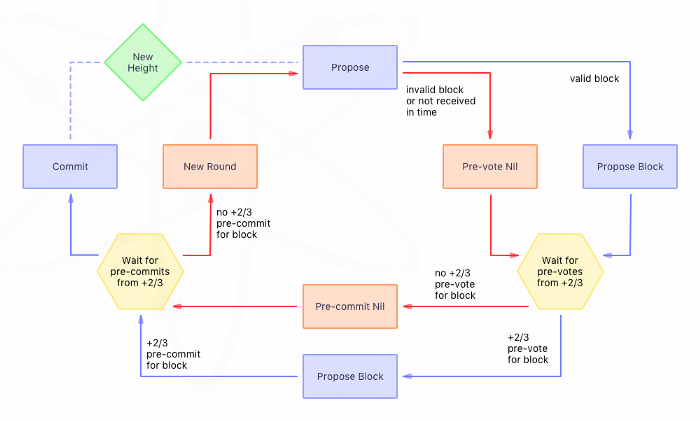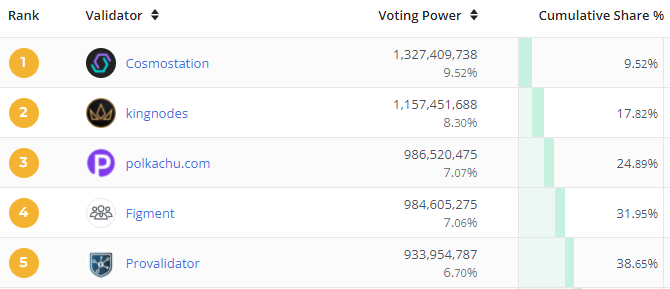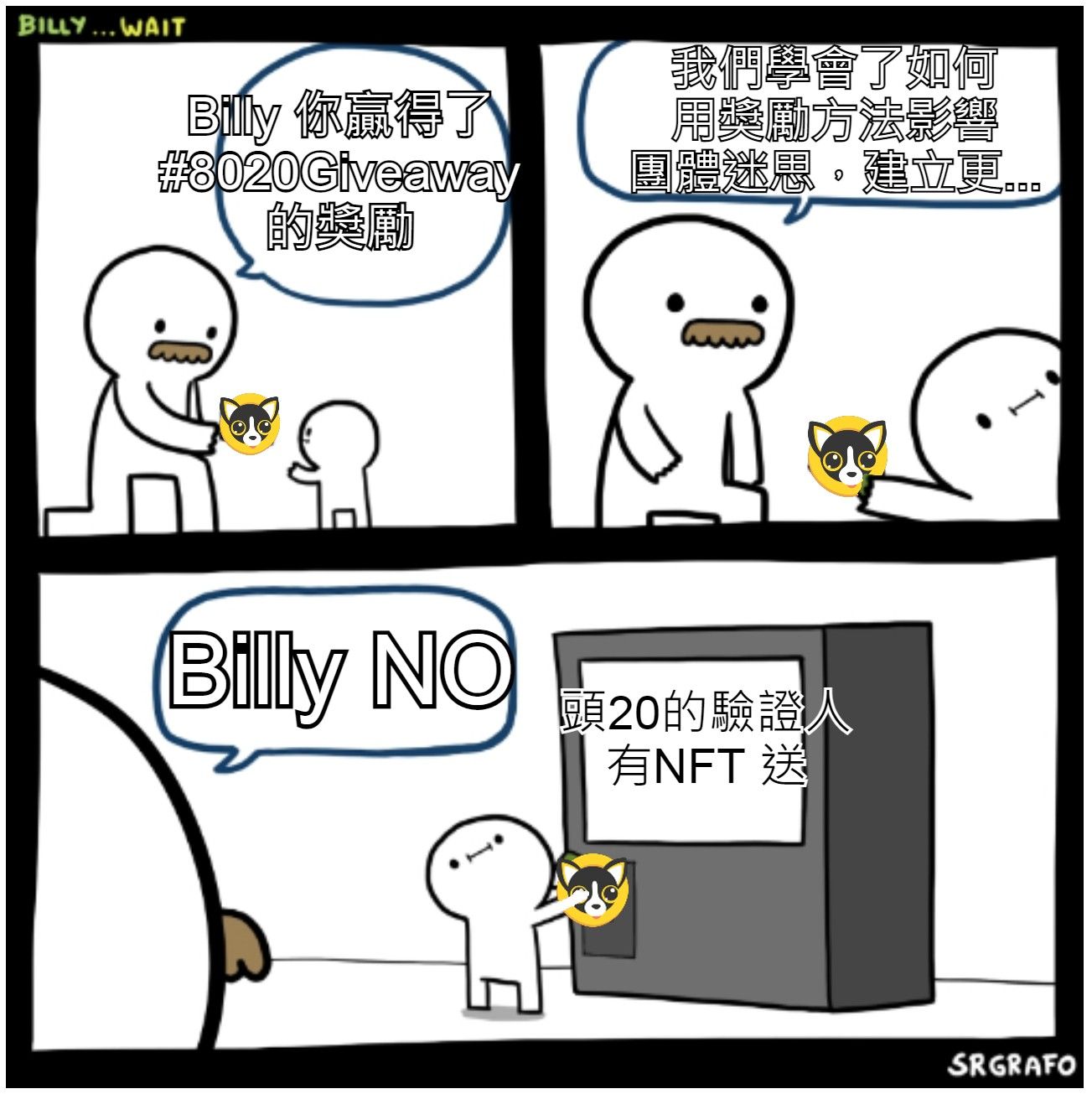
喜用文字表達,卻疏懶提筆 百足多爪,無一鋒利 人生種種弔詭,卻是世道常態 唯以基督信仰觀世,活出在地若天之道
Why you should delegate to a lower-ranked validator - and the power of #8020Giveaway
Earlier @PikachuEXE's Chihuahua coin ($HUAHUA) validator held a personal airdrop to explain what the #8020Giveaway event is, if you don't know what it is, be sure to check it out. The content of this article is suitable for most of the chains in the Cosmos ecosystem, but will mainly take the Chi Doll chain as an example.
Why do this event
To quote PikachuEXE's translation:
The first 4 validators have >33% stake, and as long as they go offline at the same time, the entire validator network cannot reach consensus (ie the network stops functioning)
Why did the first 4 validators go offline and the entire validation network could not reach a consensus?
Byzantine Fault Tolerance
We all know that the technology of the Cosmos chain is called Proof-of-Stake (PoS). In simple terms, whenever a new block is to be generated, the validators on the chain will randomly select one person based on the proportion of their delegation. The validator (P) proposes a new block, and after everyone agrees, everyone will write this new block into the chain. But how to get everyone to agree?
Before answering this question, we need to deal with, are validator P and other validators honest or error-free? If the validator P is dishonest, because his information will be wrong because of his dishonesty, when everyone catches his mistake, he will be punished. If other validators are dishonest, like validator P, he will also be caught and punished. This is the Slashing mechanism. The most frequently mentioned dishonest behavior is Double sign, that is, the same validator has two different signatures on the same block. Nodes will be imprisoned for life
But the error situation is a little different, because the reason for the error may be that the connection is just dropped. Therefore, the blockchain has a certain tolerance for the error of the validator. Of course, there will also be relative penalties for long-term mistakes.
Since we cannot avoid a validator accidentally making mistakes, how do we keep the traffic on the chain smooth, so that everyone agrees to the new block as soon as possible, so that the data can be transmitted smoothly? This is due to Byzantine Fault Tolerance (BFT). BFT teaches us that a message in a group is considered reliable as long as no more than one-third of it is falsely delivered (whether intentionally or unintentionally). (Not to mention in detail, this is a very deep and historical academic problem. If you are interested, you can Google it yourself. Also, what is really used is the Practical Byzantine Fault Tolerant (PBFT) algorithm)
There are also some differences in how different blockchains use BFT. Since this article is for the Cosmos ecosystem (and the Chi Doll chain), we just need to know how Tendermint's BFT works.
Tendermint consensus algorithm
Back to the previous question:
Whenever a new block is to be generated, the validators on the chain will randomly select a validator (P) to propose a new block using the proportion of their delegation as a probability, and after everyone agrees, everyone will This new block is written to the chain. But how to get everyone to agree?

The diagram above explains what happens when each new block appears. The following will be briefly described in words. Whenever validator P proposes a new block, validators must first vote (pre-vote) whether to agree with the block. If they agree to exceed 2/3 of the total delegation ratio ( note: not the number of validators, It is the delegated proportion represented by the verifier ), everyone will prepare to write this block on the chain (pre-commit), when the 2/3 proportion of the verifier is ready, everyone will write it on the chain, the new The block is officially formed. If it is unsuccessful, a new validator P' will be found to propose a new block, and the whole procedure will be repeated until it succeeds. On the Shiba Doll chain, this process happens within 6 seconds. (Off-topic: On the Osmosis chain, whenever a reward is issued, this process has always been unsuccessful, so it took several minutes)
critical 1/3
Therefore, if more than 1/3 of the validators agree not to sign new blocks, the chain is over. How many validators are needed to account for 1/3? Take the Chiba doll chain as an example:

It turned out that only the first five validators need to be offline at the same time, and the entire Chi Doll chain is over. (Cosmos is the top seven, Crypto.org Chain is the top four, Osmosis, Likecoin are also the top five) The influence of the first few validators is huge.
8020 problem
On the Chi Doll chain (some Cosmos ecological chains have similar problems), as of now, the delegation volume of the top 25 validators accounts for 80% of the total delegation volume. In other words, even with 100 validators, 26-100 validators (especially after 50) have far less influence on the chain than the top 25. It can be said that power is concentrated in a few people, and 100 places are completely useless.
The power of #8020Giveaway
Therefore, Jabbey, the validator on the Chi Doll chain, proposed #8020Giveaway, hoping to reduce the influence of the higher-ranked validators. He proposed this activity on January 29th. At that time, the key 1/3 was the first four validators, and the first 80% of the delegation was arranged by the first 20 validators. In just one week, the first four became the first five, and 20 became 25. Also, the total delegation of validators at 80-100 has risen quite a bit. (Lishen: SF RES Land is one of the most beneficial nodes) and the community also proposed and passed Proposal 4 in just a few days, and will inject the 5M Huahua Community Fund into this event pool. He will regularly update the latest situation of this event on Twitter, and those who are interested should not miss it.
As a delegator alone, I honestly don’t think about consensus issues, and I don’t particularly consider delegating to a lower-ranked validator. But this activity can effectively make the delegation "not centralized" (just not so, it is still very centralized). Therefore, I think the most meaningful part of this activity is to let the delegator learn to delegate to the lower-ranked and reliable validator (he explained in the original Post what a reliable validator is).
The hidden worries of #8020Giveaway
Edit: Image below with permission from Jabbey, translated from his Twitter

in conclusion
In the final analysis, as a Staker, we must make good use of your vote, so that the chain you support can truly grow in a decentralized and healthy way. Personally, according to the above point of view, the ecology of Likecoin Chain is relatively healthy, and the number of delegates of validators is relatively average (...except for the first place) (off topic: After the node of Civic Liker goes online Will there be a big change? 20,000 per person is quite a lot). Everyone remember to entrust your coins well!
refer to:
https://blog.cosmos.network/consensus-compare-casper-vs-tendermint-6df154ad56ae
postscript:
In fact, this article is a personal learning record, what I learned in order to think about whether Chihuahua should increase the number of validators. Write down what you have learned, in order to deepen your memory and make sure you actually learned it
I am Chihuahua validator SF RES Land , I hope to use Chihuahua to narrow the digital divide, welcome to support me
SF RES Land is Chihuahua Validator, striving for narrow the digital divide by Chihuahua. Please support me.
Delegate to SF RES Land:
1) https://chihuahua.omniflix.co/ Press Delegate to find SF RES Land
2) Use Delegate in Cosmostation app
Like my work?
Don't forget to support or like, so I know you are with me..
Comment…